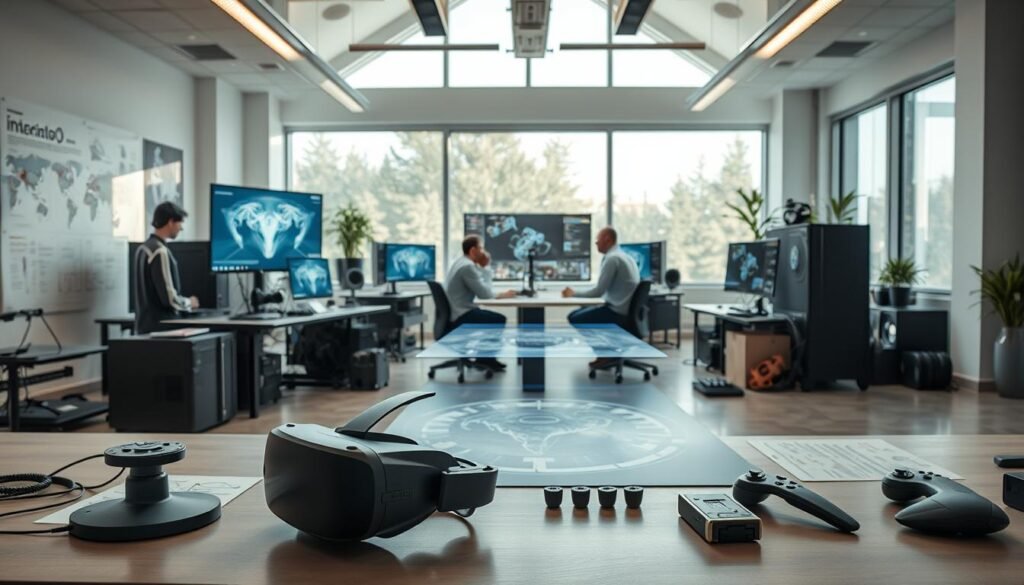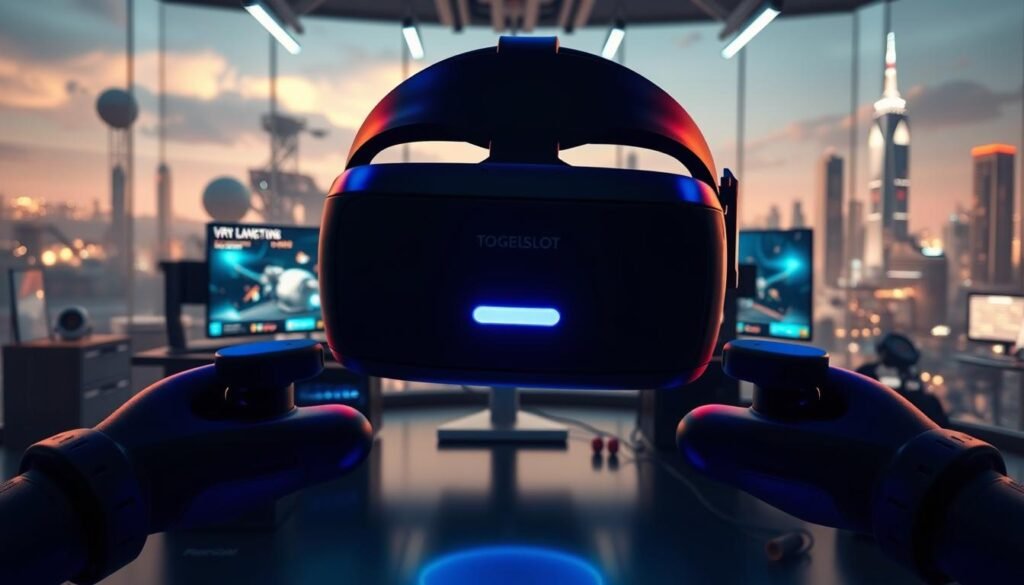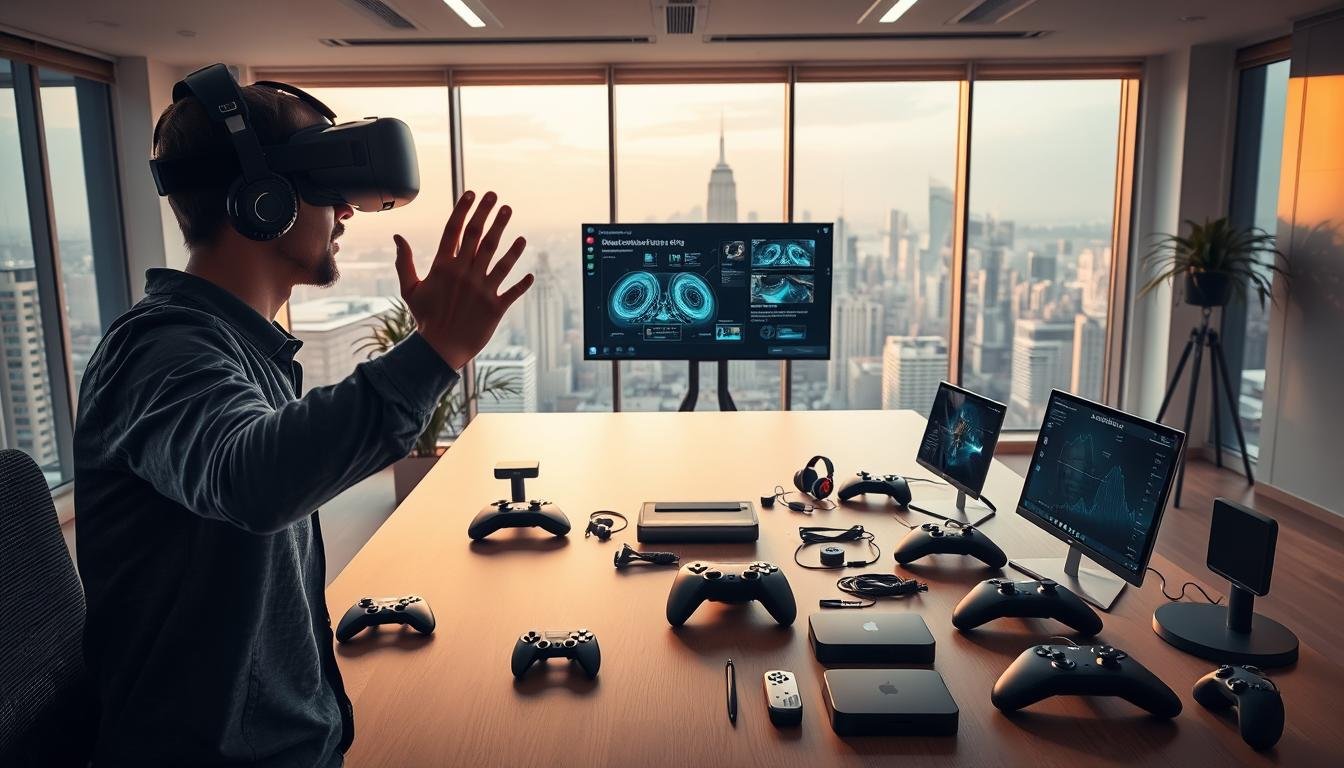Did you know that the global virtual reality market is projected to reach $62.1 billion by 2027? This rapid growth highlights the increasing importance of mastering VR skills. Whether you’re a student, developer, or tech enthusiast, understanding this technology can open doors to exciting opportunities.
This guide explores seven standout courses designed to help you grasp the fundamentals of VR. From game design to software development, these tutorials cover a range of topics. You’ll learn how to use tools like Unity and Unreal to create immersive experiences.
Platforms such as Meta Quest, PCVR, and Apple Vision Pro are transforming how we interact with digital content. This article provides detailed insights into course structures, content, and expert recommendations to kickstart your learning journey.
Key Takeaways
- Discover seven top-rated courses for learning VR basics.
- Explore tools like Unity and Unreal for immersive project creation.
- Understand the impact of platforms such as Meta Quest and Apple Vision Pro.
- Gain insights into course content and expert recommendations.
- Start your journey in VR development with confidence.
Best VR Tutorials: Your Essential Learning Guide
Mastering virtual environments has become a key skill in today’s tech-driven world. Whether you’re a beginner or an experienced developer, the right course can make all the difference. This section highlights top-rated resources and expert recommendations to help you excel in virtual reality development.
Top-Rated Courses and Expert Recommendations
Choosing the right course is crucial for your learning journey. Platforms like Coursera and Udemy offer a variety of options, each tailored to different skill levels. For instance, the University of London’s Introduction to Virtual Reality provides a comprehensive overview of the technology and its applications.
Google AR & VR and Meta also offer specialised programmes. These courses focus on practical skills, such as using Unity and Unreal for immersive design. Many include hands-on projects and video guidance to enhance your learning experience.
Insights from Industry-Leading Platforms and Educators
Industry experts emphasise the importance of structured learning. Courses with interactive modules and real-world examples are particularly effective. For example, the Unity VR tutorial for beginners is a great starting point for creating your first VR scene.
Educators recommend focusing on both software and hardware aspects. Understanding the capabilities of platforms like Meta Quest and Apple Vision Pro can significantly improve your development skills.
| Course | Platform | Key Features |
|---|---|---|
| Introduction to Virtual Reality | University of London | Comprehensive overview, beginner-friendly |
| Google AR & VR | Practical skills, hands-on projects | |
| Meta Immersive Learning | Meta | Focus on Unity and Unreal, industry insights |
These courses not only teach the basics but also prepare you for advanced design and development. By following expert recommendations, you can build a strong foundation in virtual reality and open doors to exciting opportunities.
Exploring Diverse VR Learning Platforms and Tools

With the rise of immersive technologies, learning VR has become more accessible than ever before. Whether you’re a beginner or an experienced developer, understanding the platforms and tools available can significantly enhance your skills. This section delves into the key systems and software that can help you create immersive experiences.
Platform Highlights: Meta Quest, PCVR, and Apple Vision Pro
Meta Quest, PCVR, and Apple Vision Pro are among the most popular platforms for VR development. Meta Quest offers a user-friendly interface, making it ideal for beginners. PCVR, on the other hand, provides high-end performance for advanced projects. Apple Vision Pro is gaining traction for its seamless integration with other Apple devices.
Each platform has its unique strengths. For instance, Meta Quest is known for its affordability and ease of use. PCVR excels in delivering high-quality graphics and performance. Apple Vision Pro stands out for its innovative design and compatibility with iOS ecosystems.
VR Development Toolsets and Software Options
When it comes to software, Unity and Unreal Engine are the go-to choices for many developers. Unity is particularly beginner-friendly, offering a wide range of tutorials and resources. Unreal Engine is preferred for its advanced features and high-quality rendering capabilities.
Other tools like SideQuest and Oculus Samples provide open-source projects and SDKs. These resources are invaluable for developers looking to experiment and innovate. As one expert noted,
“The right tools can transform your design process, making it faster and more efficient.”
| Platform | Key Features |
|---|---|
| Meta Quest | Affordable, user-friendly, beginner-friendly |
| PCVR | High-end performance, advanced graphics |
| Apple Vision Pro | Innovative design, iOS compatibility |
By leveraging these platforms and tools, you can accelerate your learning and create impactful projects. Whether you’re developing a game or an immersive app, these resources provide the foundation you need to succeed in the ever-evolving world of VR.
Integrating Game Engines and Coding for Immersive VR Experiences

Game engines like Unity and Unreal are essential tools for building engaging virtual reality applications. These platforms provide the foundation for creating immersive experiences, whether you’re developing a game or an interactive app. By mastering these tools, you can bring your creative ideas to life in the digital world.
Unity, Unreal, and Other Engine-Based Tutorials
Learning to use game engines effectively is a key step in VR development. Platforms like Udemy and LinkedIn Learning offer comprehensive courses that cover everything from basic principles to advanced techniques. For example, the Unity VR Development Course teaches you how to create interactive environments, while the Unreal Engine Masterclass focuses on high-quality rendering and design.
These tutorials often include coding modules that explain how to optimise your application for different platforms. As one instructor noted,
“Understanding the coding principles behind game engines is crucial for building seamless VR experiences.”
Hands-On Projects and Interactive Learning Modules
One of the best ways to learn is through hands-on projects. Many courses include practical assignments that simulate real-world development scenarios. For instance, you might create a virtual museum tour or design a simple game. These tasks help you apply theoretical concepts and develop tangible skills.
Interactive learning modules also play a vital role. They allow you to experiment with different features and troubleshoot common challenges. This practical approach ensures you’re well-prepared to tackle complex projects as a developer.
By combining theoretical knowledge with real-world practice, these courses provide a complete understanding of the VR development lifecycle. Whether you’re a beginner or an experienced developer, these resources can help you create impactful applications.
Conclusion
Virtual reality is reshaping industries, offering endless opportunities for innovation. By choosing the right course, you can accelerate your journey into this dynamic field. Platforms like Unity and Unreal provide the tools to craft immersive experiences, whether for gaming, education, or business applications.
Selecting the right development platform is equally important. Meta Quest, PCVR, and Apple Vision Pro each offer unique advantages for creating impactful projects. These tools, combined with expert guidance, can help you master the art of design and coding.
As the industry grows, the potential for virtual reality continues to expand. From entertainment to education, its applications are vast and transformative. Start your journey today by exploring the recommended resources and tools.
For further insights into creating immersive content, check out this guide on VR video editing. Embrace the future of technology and unlock your potential as a developer in this exciting field.
FAQ
What are the benefits of learning through VR tutorials?
VR tutorials offer immersive, hands-on experiences that enhance understanding and retention. They allow you to interact with 3D environments, making complex concepts easier to grasp.
Which platforms are best for VR learning?
Meta Quest, PCVR, and Apple Vision Pro are popular platforms. Each offers unique features tailored to different learning needs and hardware setups.
What tools are essential for VR development?
Unity and Unreal Engine are widely used for creating immersive experiences. Additional software like Blender and Visual Studio can also enhance your development process.
Are there beginner-friendly VR tutorials available?
Yes, many platforms offer beginner-friendly courses. These tutorials focus on foundational skills, making it easy for newcomers to get started.
Can I learn VR development without prior coding experience?
Absolutely. Many tutorials cater to beginners, providing step-by-step guidance on coding and development basics.
What are some recommended VR learning resources?
Platforms like Coursera, Udemy, and YouTube host expert-led courses. These resources cover everything from basic concepts to advanced techniques.
How can I practice VR development skills?
Hands-on projects and interactive modules are excellent for practice. They allow you to apply what you’ve learned in real-world scenarios.
Is VR learning suitable for students?
Yes, VR learning is ideal for students. It provides an engaging way to explore subjects like coding, design, and technology.
Source Links
- Introduction – A-Frame
- Does Mindfulness Mediated by Virtual Reality Help People with Functional Diversity?
- How to leverage virtual reality (VR) to build equity in education
- XReadyLab.com | Best VR education | Free 3D models | Science | Tools for teachers | VR classroom How VR Can Enhance Critical Thinking and Creativity in STEM %
- XReadyLab.com | Best VR education | Free 3D models | Science | Tools for teachers | VR classroom The Intersection of VR and AI in the Future of School Education %
- Unity – Manual: XR
- Entry-Level Training in 2025: A Strategic Guide for Modern Workforce Development
- LMS for Virtual Reality Learning: How VR Transforms Online Training
- Augmented Reality Frameworks: Building Immersive Experiences
- Manual: VR and MR development in Unity
- Bring NVIDIA ACE AI Characters to Games with the New In-Game Inferencing SDK | NVIDIA Technical Blog
- Social presence in shared virtual reality experience among older adults – Virtual Reality
- iVRPM: Conceptual Proposal of an Immersive Virtual Reality Pedagogical Model
- Fostering Inclusion: A Virtual Reality Experience to Raise Awareness of Dyslexia-Related Barriers in University Settings
- How VR & Gamification Are Transforming Nursing Education
